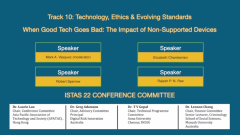A Roboticist, Ethicist and Novelist Walk Into a Bar: IEEE TechEthics Panel at SXSW
About the Talk: How do we separate science fact from science fiction? What is the reality of where we truly are with robotics and AI capabilities? How do media portrayals shape our opinions on technology? And how are the ethical and societal implications of technology considered in each realm? In this panel discussion, a roboticist, an ethicist, and a graphic novelist discuss their roles in the messaging around technological advancements. Part of the IEEE Tech for Humanity Series at SXSW 2018.
About the Speakers:
Stephen Cass (moderator) is a senior editor with IEEE Spectrum. He is a veteran technology journalist specializing in computers, electrotechnology, and space exploration. Cass has also spent a significant part of his career exploring the intersection between science fiction and science fact. He has edited critically acclaimed science fiction anthologies commissioned by MIT Technology Review and IEEE Spectrum; is the co-author of volumes one and two of "Hollyweird Science," a series of books examining the representation of science and engineering on screen; and has spoken at or moderated panels on the topic from the San Diego Comic Con to the Hannover CeBIT business festival.
Ryan Jenkins studies the moral dimensions of technologies with the potential to profoundly impact human life. He is an assistant professor of philosophy and a senior fellow at the Ethics & Emerging Sciences Group at California Polytechnic State University, San Luis Obispo. His interests include driverless cars, algorithms, autonomous weapons, and military ethics more broadly. His work has appeared publicly in Forbes, Slate and elsewhere, and he is currently co-editing two books on military ethics and robot ethics, both for Oxford University Press. At Cal Poly, Jenkins teaches courses in ethics, political philosophy, and the philosophy of technology, among others. He earned his B.A. in philosophy from Florida State University, Phi Beta Kappa, and his Ph.D. in philosophy from the University of Colorado Boulder. His interests are in applied ethics (especially military ethics and emerging technologies), and normative ethics (especially consequentialism).
Lynne Parker is an Associate Dean in the Tickle College of Engineering at the University of Tennessee-Knoxville (UTK), and a Professor in UTK’s Department of Electrical Engineering and Computer Science. Prior to becoming Associate Dean, she served for two years as the Division Director for Information and Intelligent Systems at the National Science Foundation (NSF). During her service at NSF, she co-led a White House-commissioned task force that created the U.S. National Artificial Intelligence Research and Development Strategic Plan. She also served previously as a Distinguished Research and Development Staff Member at Oak Ridge National Laboratory. Dr. Parker received her Ph.D. in computer science from the Massachusetts Institute of Technology. She is a leading international researcher in the field of cooperative multi-robot systems, and has performed research in the areas of mobile robot cooperation, human-robot cooperation, robotic learning, intelligent agent architectures, and robot navigation. Her dissertation research (1994) on ALLIANCE, a distributed architecture for multi-robot cooperation, was the first PhD dissertation worldwide on the topic of multi-robot systems, and is considered a pioneering work in the field. For this research, she was awarded the U.S. Presidential Early Career Award for Scientists and Engineers; she has also received many other awards for her teaching, research, and service. Dr. Parker has been active in the IEEE Robotics and Automation Society (RAS) for many years; she served as the General Chair for the 2015 IEEE International Conference on Robotics and Automation, as the Editor-in-Chief of the IEEE RAS Conference Editorial Board, as an Administrative Committee Member of RAS, and as Editor of IEEE Transactions on Robotics. She is a Fellow of the Institute for Electrical and Electronics Engineering (IEEE).
Robert Venditti is the New York Times best-selling author of the sci-fi graphic novel The Surrogates, which was adapted into a feature film starring Bruce Willis and Ving Rhames. He has written the monthly comic book series X-O Manowar and Wrath of the Eternal Warrior for Valiant, and Green Lantern and The Flash for DC. He currently writes Hal Jordan and the Green Lantern Corps. His newest series, Damage, debuted in January 2018.
Recorded at SXSW Interactive in Austin, TX, USA on 9 March 2018. This recording was made possible in part by a grant from the IEEE Foundation.
About the Talk: How do we separate science fact from science fiction? What is the reality of where we truly are with robotics and AI capabilities? How do media portrayals shape our opinions on technology? And how are the ethical and societal implications of technology considered in each realm? In this panel discussion, a roboticist, an ethicist, and a graphic novelist discuss their roles in the messaging around technological advancements. Part of the IEEE Tech for Humanity Series at SXSW 2018.
 Cart
Cart Create Account
Create Account Sign In
Sign In





